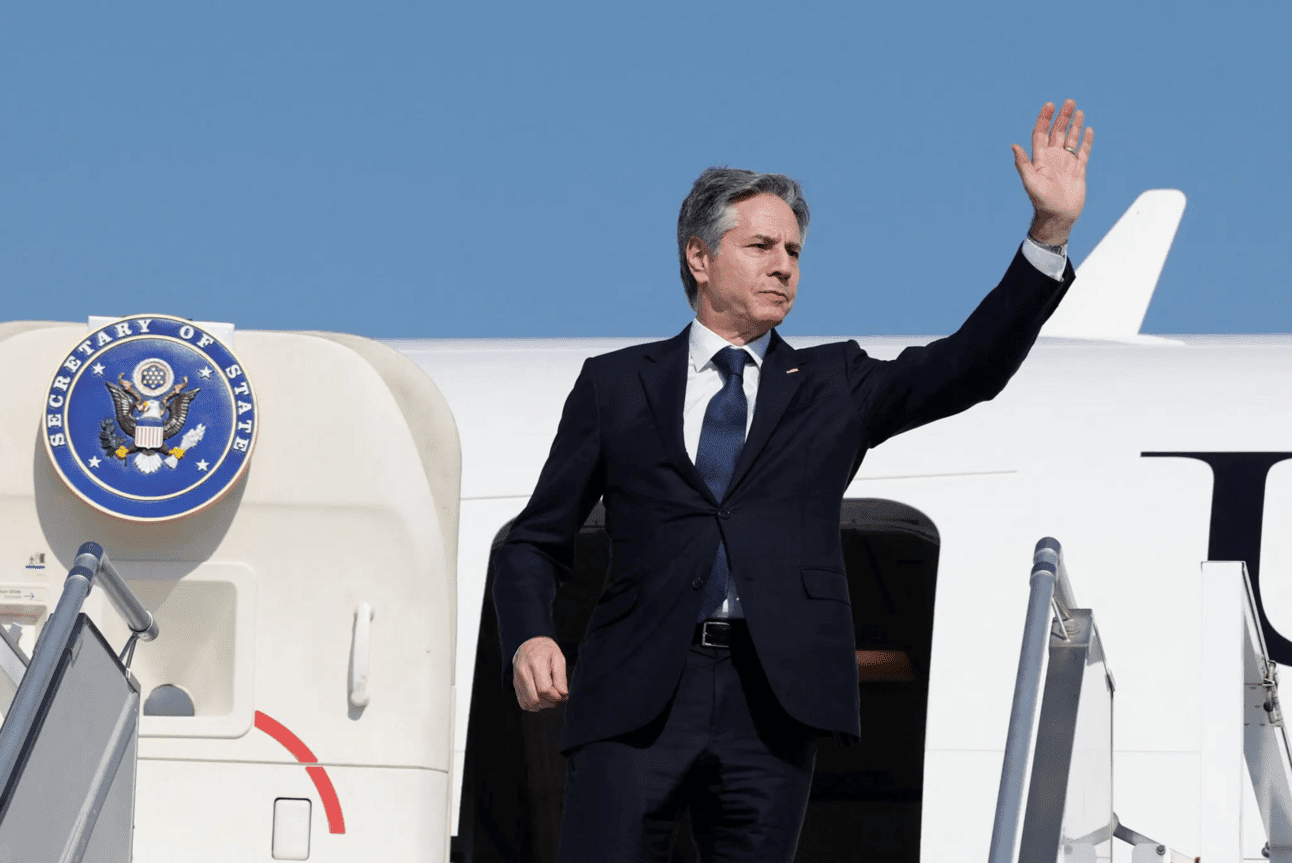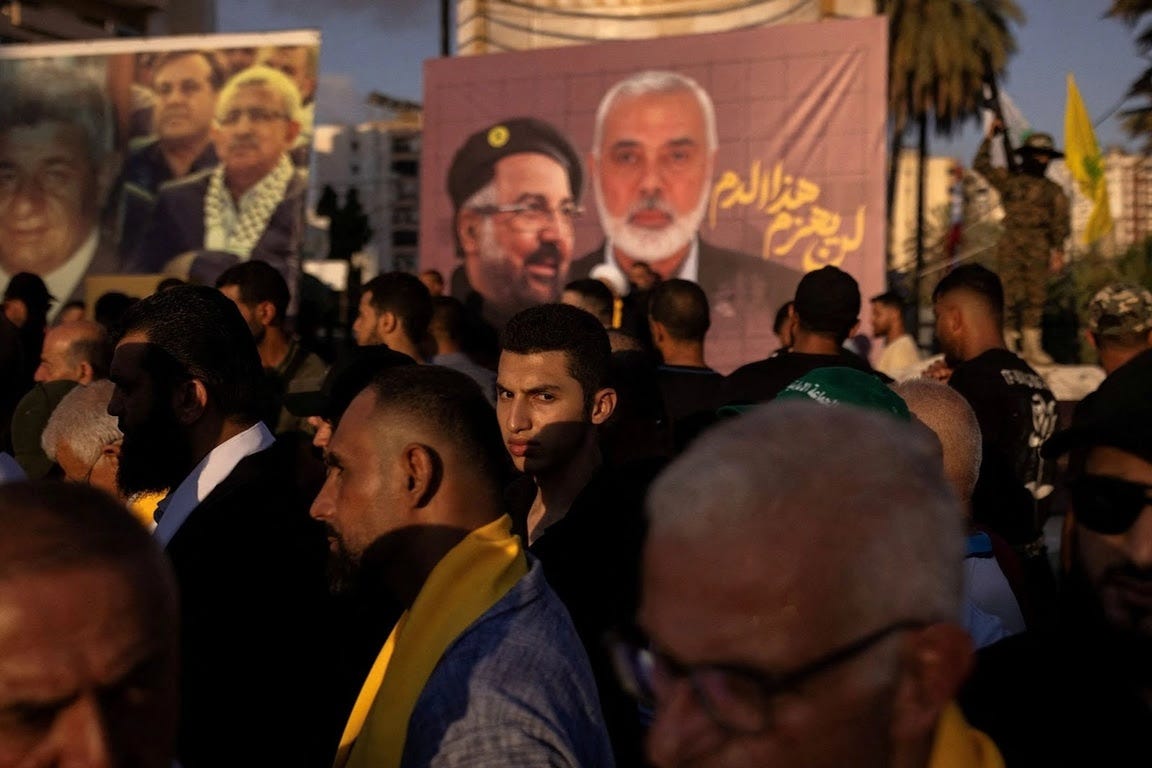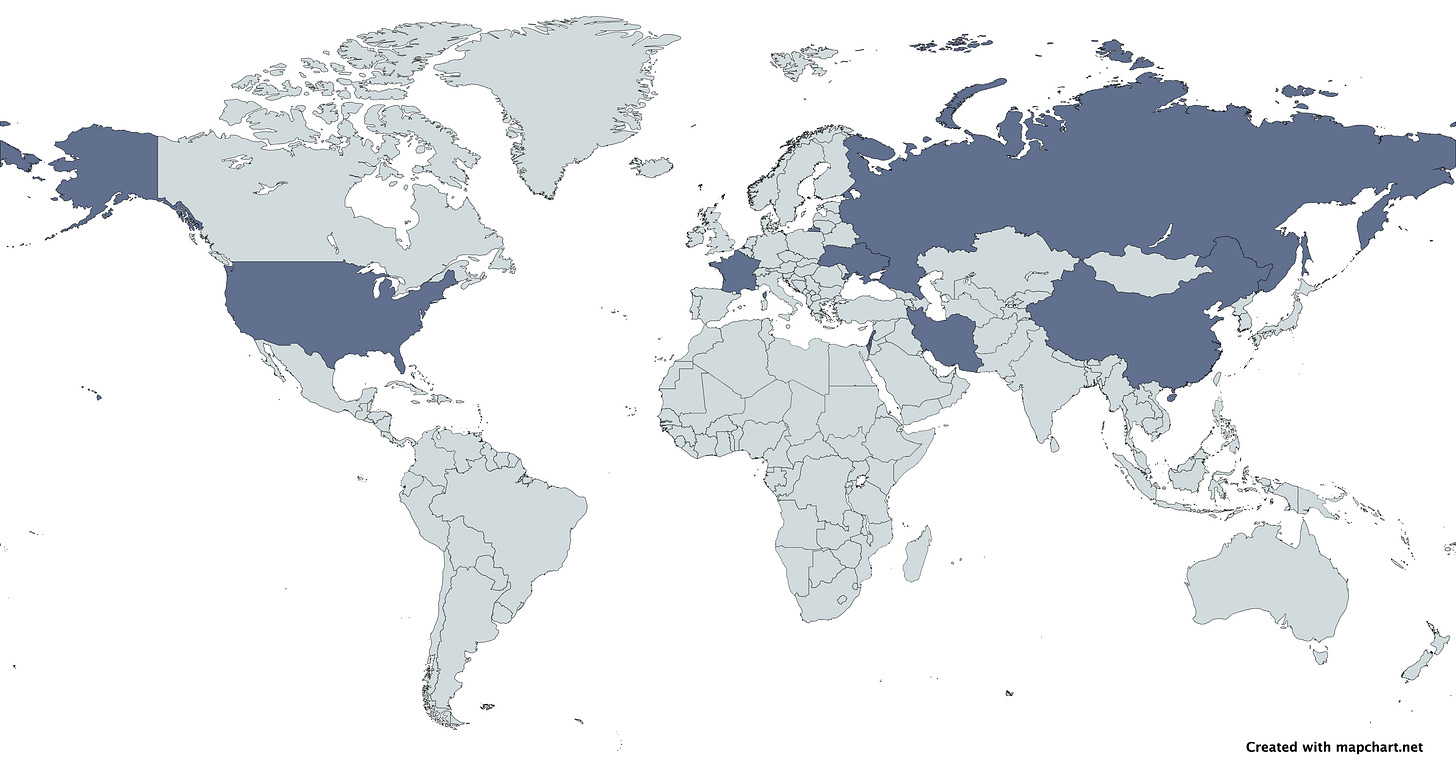Blinken cancels Middle East tour, yet again
All awaits Iran's response, and whatever else is happening across the world
🌍 Welcome to a new edition of Matter of Fact! Your local tour guide on everything global affairs
Oh, and if you haven’t already subscribed, click below and join hundreds of folks curious about global events 👇🏻
Blinken postpones Middle East trip as world awaits Iran’s response
As you read this, US Secretary of State Antony Blinken was supposed to be touching down for his ninth diplomatic blitz in the Middle East since October 7th — the idea was to urge allies, partners, and anyone else who’ll listen to avoid a full regional conflict, 10 months into the Israel-Hamas war.
But then abruptly on Tuesday afternoon, word emerged that the trip was off. It wasn’t entirely surprising, as the details were always elusive — reporters never got Blinken’s schedule, and the White House had just warned on Monday that US intelligence, matching an Israeli assessment, now assesses Iran and/or its proxies could “attack Israel as early as this week”. (They’ve been saying the same thing for over two weeks now <sigh>. It should be clear by now, that no one knows the timing, including perhaps Iran itself, which is nervous about potential knock-on effects and may prefer to wait for the outcome of Gaza ceasefire talks)
Anyway, Blinken’s aides unpacked their bags, cleared his schedule, and the Secretary has stayed put in Washington...for now.
But the Middle East is on edge. Again. Or still. Maybe both?
♻️ For a quick refresh, in just the last two weeks…
Iran inaugurated its new ‘reformist’ president
One of his guests was Hamas chief Ismail Haniyeh, who Israel then assassinated in a supposedly secure Tehran compound hours later
A humiliated Iran has been vowing revenge ever since
And it’s been dismissing Western calls to show restraint.
But… Iran’s mission to the UN added a plot twist last Thursday, declaring its first priority is "a durable Gaza ceasefire", while avenging Haniyeh’s assassination was a mere #2. Quite the to-do list. Btw, a quick side-bar:
Iran sometimes back-channels messages via its UN mission, though its UN diplomats sometimes also just say whatever they think sounds good.
But then… yesterday (Tuesday), Joe Biden gave some credence to the possibility of Iran holding fire for now, answering tarmac reporters who asked if he expected Iran to hit pause if there’s a deal in Gaza: “That is my expectation.“
So it’s now been two weeks since Haniyeh’s assassination on July 31, and while spooks and reporters have poured over the slightest shift of a tea trolley on each Iranian base, it’s still been business as usual - more rocket attacks from Iran’s proxies in Gaza (Hamas) and Lebanon (Hezbollah), plus continued Israeli strikes too.
It’s also meant that for newsrooms everywhere, we’ve had multiple days of high-alert, only to then pivot to closing ceremony of the Olympic games in Paris instead. It’s a lot.
🤔 But has anything really changed?
While Blinken has postponed his trip, the US has still sent top Middle East adviser Brett McGurk to Cairo and senior envoy Amos Hochstein to Lebanon this week, while CIA director Bill Burns is still scheduled to visit Qatar tomorrow (Thursday) for the latest round of negotiations.
🙋♂️ My Take
So then, what (if anything) does Blinken’s trip postponement really mean?
The thinking behind sending someone as senior as Blinken is a little more nuanced than it might seem:
Sometimes you send a minister because the conditions are right, and VIP engagement can help get a deal over (or at least nearer) the line
Sometimes there’s little prospect of VIP engagement making any real difference, but there’s still value in turning up as a way to signal to regional and domestic constituencies (“at least we’re trying”), and
Sometimes cancelling a trip can send a signal too, particularly when it’s alongside new US naval deployments (ie, “we’re serious”)
Blinken’s itinerary has reflected each of these signals at times, and diplomats everywhere will now be trying to parse this latest signal from the noise.
But the US could also be signalling frustration with Israeli leader Benjamin Netanyahu, given his own fluctuating approach to negotiations: Blinken’s pause comes just hours after the second joint US call for a Gaza deal this week - the first was with regional partners, the second was with Europe.
Both texts make blunt references to “all parties," but when one of those parties is a listed terrorist organisation with key leaders either dead or in hiding, the message might sound a little louder for the other party: Israel.
📝 Also worth noting:
The US confirmed approval for a new $20B weapons sale to Israel yesterday (Tuesday).
UK Prime Minister Keir Starmer spoke on the phone with Iranian President Pezeshkian on Monday, emphasising that “war was not in anyone’s interests.”
Iran is still reportedly seeking to avenge the US assassination of Qasem Soleimani from back in 2020.
In other words: No Bueno. It’s been an eerily quiet two weeks to breathe a sigh of relief.
Meanwhile Elsewhere
🇪🇺 European Union: The EU’s digital chief, Thierry Breton, is facing flack at home after failing to give others (like his boss Ursula von der Leyen) a heads-up before publicly warning Elon Musk about “harmful content” on Twitter. His open letter referred to Musk’s interview with Donald Trump, triggering concerns the EU could be seen as interfering in a US election.
🇵🇸 Western leaders denounced the visit by a far-right Israeli minister to Jerusalem’s most contested site. Security Minister Itamar Ben-Gvir led hundreds of Jewish Israelis into the al-Aqsa mosque compound, known to Jews as Temple Mount, flouting a ban on Jewish prayer there. His visit spotlighted growing fractures in Israel’s coalition government, forcing Prime Minister Benjamin Netanyahu to publicly rebuke a senior minister for the second time this week. The move makes the prospect of progress in talks to pause the Gaza war — which has thus far left nearly 40,000 dead after the Oct. 7 Hamas attacks that killed 1,100 — even more remote, with negotiations ostensibly set to resume on Thursday.
🇷🇺 Russia diverted troops from Ukraine to defend itself against Kyiv’s incursion into its territory. Ukraine has not publicly outlined its goals for the surprise incursion — which Kyiv says has resulted in it taking control of about 400 square miles (1,000 square kilometers) of Russian land — but analysts have variously suggested it wants to boost domestic morale, draw Moscow’s forces away from frontlines in eastern Ukraine, and win a bargaining chip in any future negotiations to end the war. Kyiv’s battlefield successes came with European nations ramping up their own military capacity: Poland signed a $10 billion deal to buy nearly 100 Apache helicopters, underscoring how the continent, once divided over debt and migration, is now focused on security.
🇧🇷 The Amazon rainforest stores as much as two years’ worth of global carbon emissions, but its role as a carbon sink is under threat. According to a new report by Amazon Conservation, rising deforestation, which releases CO2 and other greenhouse gasses trapped in trees, means the Amazon could soon contribute more carbon than it stores. Brazilian officials have vowed to crack down on logging in the Amazon — notably by illegal miners prospecting for gold — but the practice endures: Small-scale gold mining in Brazil’s protected areas nearly doubled between 2018 and 2022. Years of underfunding and lack of enforcement encapsulate “the challenge of protecting the Brazilian Amazon,” a local environmental researcher told the Financial Times.
🇨🇳 Chinese authorities are building a huge wall of solar panels in a bid to combat desertification. The 250-mile (400-kilometer) stretch in the Kubuqi Desert in Inner Mongolia, west of Beijing, will generate an estimated 100 gigawatts of electricity and combines two of the country’s priorities: expanding its solar-power industry and halting the encroachment of the desert into urban areas and fertile land. The effort faces huge challenges, like building out the transmission capacity to get the electricity from the desert to China’s economic hubs, which lie along or near its coast. But the payoff could also be enormous, and offers a case study for countries globally combating desertification.
🇺🇸 Burning Man failed to sell out, a rarity that regulars blame on extreme weather events and equally extreme ticket prices. The Nevada desert festival released a last-minute pool of 3,000 tickets as fans stayed away. It may be partly due to memories of last year’s event, which was nearly washed away in uncharacteristic desert rains, leaving 77,000 people stranded and forcing celebrity attendees like Chris Rock to flee cross-country. The year before, temperatures reached 39°C (103°F), with some needing treatment for heatstroke. The fact that it costs at least $780 to enter the festival with a vehicle may also have influenced sales.
🇫🇷 The end of the Olympics has meant France must once again confront its deadlocked politics. French President Emmanuel Macron had enjoyed an “enchanted interlude” during the Games, but now has to finally deal with the fallout from elections last month in which his centrist bloc was beaten by both the hard left and far right. He first has to appoint a new prime minister, a tall task given the polarization within the country’s fractious legislature. “The objective is always the same,” an official at the presidential palace told Le Monde: “a coalition that is as broad and stable as possible.”






